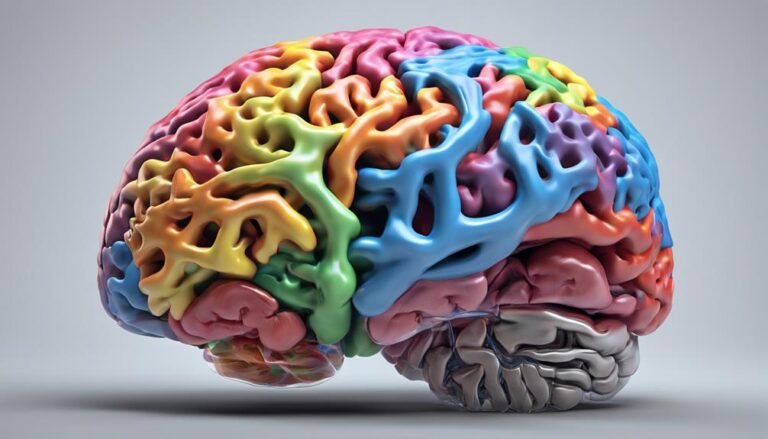Self-Efficacy in Bandura’s Theory
Imagine if you could harness your belief in your abilities as a powerful tool that shapes your success across various aspects of life. Self-efficacy in Bandura's Theory offers a fascinating insight into how our perceptions of our capabilities can impact our achievements. From understanding the origins of self-efficacy to exploring its real-world applications, this discussion will reveal the intricate ways in which self-efficacy influences motivation, behavior, and ultimately, success. Join in to discover practical strategies for enhancing your self-efficacy and unleashing your full potential.
Key Takeaways
- Childhood experiences shape self-efficacy beliefs.
- Social learning influences self-perception.
- Mastery experiences impact belief in capabilities.
- Setting realistic goals enhances self-efficacy.
- Self-efficacy influences motivation and behavior.
The Origins of Self-Efficacy
The origins of self-efficacy can be traced back to the seminal work of psychologist Albert Bandura. Bandura's theory emphasizes the role of childhood experiences in shaping an individual's beliefs about their capabilities, known as self-efficacy.
Through social learning, children observe and imitate the behaviors of others, influencing their own self-perception of what they can achieve.
Cognitive development also plays an essential role in the formation of self-efficacy. As individuals grow and learn, they develop cognitive schemas that impact how they interpret and respond to different situations.
These schemas are influenced by environmental factors such as family dynamics, cultural norms, and societal expectations. Positive experiences and supportive environments can enhance self-efficacy, while negative experiences or lack of support can undermine it.
Components of Self-Efficacy
Understanding self-efficacy involves recognizing the distinct components that contribute to an individual's belief in their abilities to successfully perform tasks and achieve goals. In Bandura's theory, self-efficacy components include mastery experiences, vicarious experiences, social persuasion, and physiological and emotional states.
Mastery experiences refer to past successes or failures in similar tasks that shape one's belief in their capabilities. Vicarious experiences involve observing others similar to oneself successfully completing tasks, which can boost self-efficacy. Social persuasion pertains to verbal encouragement or discouragement from others influencing one's belief in their abilities. Finally, physiological and emotional states encompass how one's physical and emotional condition can impact their self-efficacy beliefs.
The importance of understanding these components lies in the role they play in the development of self-efficacy, shaping individuals' beliefs in their capacity to overcome challenges and achieve desired outcomes. By comprehending these components, individuals can work towards enhancing their self-efficacy and ultimately improving their performance and motivation.
Impact on Motivation and Behavior
An individual's self-efficacy beliefs greatly influence their motivation and subsequent behavioral patterns. Self-efficacy plays a pivotal role in shaping intrinsic motivation, which is the inner drive to engage in activities for their own sake rather than for external rewards or pressures. When individuals have high self-efficacy in a particular task or skill, they're more likely to be intrinsically motivated to pursue and excel in that area.
Moreover, self-efficacy impacts how individuals respond to external influences. Those with strong self-efficacy are better equipped to resist negative external influences that may hinder their progress or deter them from pursuing their goals. This ability to self-regulate and stay focused on their objectives is closely tied to self-efficacy.
Furthermore, individuals with high self-efficacy are more effective in setting and pursuing challenging goals. They exhibit greater perseverance, resilience, and commitment to their objectives, leading to more positive behavioral outcomes.
Strategies for Building Self-Efficacy
To enhance your self-efficacy, focus on setting realistic goals that are challenging yet attainable.
Engage in positive self-talk by acknowledging your strengths and capabilities.
These strategies can help you build confidence in your ability to succeed in various tasks and challenges.
Setting Realistic Goals
As a result, setting realistic goals is a fundamental strategy for enhancing self-efficacy according to Bandura's theory. By establishing clear and achievable objectives, individuals can experience a sense of accomplishment through goal achievement. Setting specific, measurable, and time-bound goals provides a roadmap for progress tracking, allowing individuals to monitor their advancement and adjust their efforts accordingly.
Research shows that individuals with well-defined goals are more likely to persevere in the face of challenges and setbacks, leading to increased self-efficacy beliefs.
Moreover, setting realistic goals fosters a positive feedback loop where each successful milestone reached reinforces one's belief in their abilities to tackle future tasks. This process of incremental goal setting and achievement contributes to the development of a strong sense of self-efficacy, empowering individuals to take on increasingly challenging endeavors with confidence.
As a result of strategically setting and attaining realistic goals, individuals can enhance their self-efficacy and pave the way for continued personal growth and success.
Positive Self-Talk
Establishing positive self-talk habits is a key strategy for enhancing self-efficacy beliefs in Bandura's theory. Engaging in a positive inner dialogue can greatly contribute to a confidence boost and mental strength. When individuals practice positive affirmations and self-encouragement, they're more likely to develop a resilient mindset that can help them navigate challenges and setbacks effectively.
Research suggests that individuals who engage in positive self-talk tend to exhibit higher levels of self-efficacy. By consciously replacing negative thoughts with constructive and optimistic ones, individuals can cultivate a more empowering belief in their abilities to achieve their goals. This shift in mindset can lead to increased motivation, perseverance, and overall performance.
Moreover, positive self-talk can serve as a powerful tool in overcoming self-doubt and building resilience. By reinforcing one's capabilities and worth through affirming self-talk, individuals can bolster their self-efficacy and approach tasks with a greater sense of determination and confidence.
Ultimately, fostering a habit of positive self-talk can be instrumental in enhancing self-efficacy and achieving success in various domains of life.
Self-Efficacy in Real-world Applications
Implementing Bandura's theory of self-efficacy in real-world scenarios requires a systematic approach to enhance individuals' beliefs in their abilities to achieve desired goals. In the domain of workplace performance and academic achievement, individuals with high self-efficacy tend to set challenging goals, persevere in the face of obstacles, and view failures as opportunities for growth. This leads to greater job satisfaction, improved task performance, and higher academic success rates.
Similarly, in sports performance and artistic abilities, self-efficacy plays an essential role. Athletes and artists who believe in their capabilities are more likely to push themselves beyond their limits, adapt to new challenges, and excel in their respective fields.
Research shows that individuals with high self-efficacy in sports are more resilient to pressure situations and perform better under stress. Likewise, artists with strong self-efficacy are more creative, innovative, and willing to experiment with new techniques.
Enhancing Self-Efficacy for Success
To enhance your self-efficacy for success, it's vital to set achievable goals that are challenging yet attainable.
By gradually increasing the difficulty of tasks and practicing regularly, you can build your self-belief and confidence in your abilities.
This continuous cycle of setting goals and practicing will help you develop a strong sense of efficacy in various aspects of your life.
Setting Achievable Goals
Developing realistic and attainable objectives is essential for enhancing self-efficacy in Bandura's theory, fostering a sense of confidence and capability in achieving success. Setting achievable goals plays a crucial role in boosting self-esteem and providing individuals with a roadmap for progress. When goals are within reach, individuals are more likely to experience success, leading to an increase in self-efficacy.
Personal growth is facilitated through the process of setting achievable goals. As individuals work towards accomplishing these objectives, they not only enhance their skills and knowledge but also build a foundation for future success. Progress tracking is instrumental in ensuring that goals remain attainable and adjusting strategies as needed to stay on track.
Building Self-Belief Through Practice
Achieving self-belief through consistent practice is a fundamental aspect of enhancing self-efficacy for success in Bandura's theory. When you engage in regular practice, you aren't only honing your skills but also building your performance confidence. As you consistently work on improving your abilities, you begin to develop a sense of mastery over the tasks at hand. This growing confidence in your capabilities is essential for boosting your self-efficacy and increasing your chances of success.
Moreover, practice consistency isn't just about skill improvement; it also contributes to your mental strength. Through repeated practice, you not only enhance your technical skills but also condition your mind to handle challenges more effectively. This mental resilience plays a significant role in shaping your belief in your ability to overcome obstacles and accomplish your goals.
Therefore, by prioritizing regular and focused practice, you aren't just refining your skills but also fortifying your self-belief for greater success in line with Bandura's theory.
Conclusion
To sum up, self-efficacy in Bandura's theory plays a vital role in shaping individuals' beliefs in their abilities to achieve success.
By understanding the origins, components, and impact of self-efficacy, one can effectively enhance motivation and behavior.
Utilizing strategies for building self-efficacy and applying it in real-world applications can lead to significant improvements in performance.
Remember, with a strong sense of self-efficacy, you can conquer any challenge and reach unimaginable heights.







